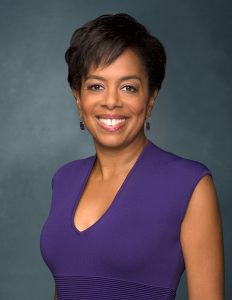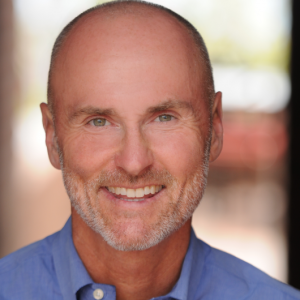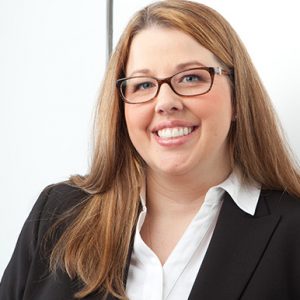As Seen on TV: 5 Questions with Sharon Epperson

CNBC Senior Personal Finance Correspondent Sharon Epperson is one of the busiest people we know. Not only is she regularly on the air with CNBC, she also appears on On the Money and the Nightly Business Report. Her personal finance writing has been featured in USA Weekend magazine, The Boston Globe and The Wall Street Journal, among other publications. She is a lead contributor to CNBC’s “Invest in You: Ready. Set. Grow.,” a multi-platform financial wellness and education initiative in partnership with the micro-investing app Acorns. And then there’s her book, The Big Payoff: 8 Steps Couples Can Take to Make The Most of Their Money- and Live Richly Ever After.
Sharon also happens to be someone who we admire as an advocate for thoughtful financial planning at every stage of life. That “what if” mentality played a key role as she recovered from a sudden, life-threatening brain aneurysm in 2016. The financial groundwork that she had lain years earlier made a decisive difference in protecting her assets and providing her family with much-needed clarity during that difficult time. Unsurprisingly, Sharon describes herself as “a firm believer that we should focus on what we can control when it comes to our money.”
Below she shares her insights on why financial literacy is especially critical for seniors, the four documents that could save your financial life, what makes for a healthy relationship with a financial advisor, the tax bite associated with certain retirement savings plans, and more.
Call it five questions plus a bit of a bonus. You’re welcome.
*The opinions expressed in our 5 Questions interviews do not necessarily reflect the views of ALEX.fyi. Our goal is to provide perspectives from different thought leaders in the space.
ALEX.fyi:
You’ve discussed how to break up with your financial advisor. How should individuals determine that a breakup is in order, or when a change in communication strategy will do the trick?
SE:
Concerns about investment returns may be one reason people break up with their financial advisor. However, many times the reason that people decide to cut ties or switch advisors is because of a major life event: you got married, divorced, you had a child, you received an inheritance, you started or ended a business, or you (or your partner) left a job. When your financial situation changes but the advice you are receiving does not, that’s a problem; it shows there’s a disconnect between you and the person helping you manage your finances. You should make sure that the advisor is coming up with a strategy that specifically fits your financial goals.
Communication is key. Talk to your financial advisor regularly. Even if you’ve had a long relationship, even friendship, with your advisor, that doesn’t mean you should be taken for granted. As firms grow, some advisors may pawn off clients to their junior associates. They may send newsletters instead of direct emails or phone calls. You want to have regular, personal communication with your advisor. If you don’t, then it’s probably time to break up.
ALEX.fyi:
Further to that point, what is a good way to ask some of the hard questions that you identified, those about the transparency of fees and the ability of an advisor to keep up with the times?
SE:
When the advisor only calls you up to make a trade or sell a product, that’s another major red flag that should let you know it’s time to let that “advisor” go. If they’re anxious to sell you a particular mutual fund, annuity or life insurance policy, it’s likely because the advisor will get a commission if you buy it. You want to make sure that whatever they are suggesting that you do with your money is in your best interest, not theirs. If you have any questions about their loyalty, it’s time to look elsewhere.
One of the first questions you should ask an advisor is how they are getting paid. Find out if they receive a commission if you buy the products that they recommend. You want to understand all of the investment fees. Bottom line: Find out if the advisor adheres to the “fiduciary standard”, which requires advisors to put their clients’ interests above their own. It’s a standard that investment advisers who are registered with and regulated by the Securities and Exchange Commission must follow. A broker who gets a commission on the sale of a product is not a “fiduciary”, their objective is to simply find a “suitable” investment for you, which may be one that pays them the most but is not the best product for your financial goals.
Ask the financial advisor flat out – “Are you a fiduciary?” Search for the financial advisor’s name and/or firm on the SEC website to determine if they are a registered investment adviser. You can also review their “Form ADV” to see if there are any disclosures or complaints against them. The National Association of Personal Financial Advisors (NAPFA) is an organization representing fee-only advisors who uphold a “fiduciary oath” to “be proactive in disclosing any conflicts of interest that may impact a client.” To find a fee-only advisor in your area, go to Napfa
ALEX.fyi:
You’ve highlighted how important it is for parents to both start “the money talk” with their kids and to keep open that line of conversation. On the flip side, how important is it for grown children to have “the money talk” with their own aging parents? How can they begin to discuss whether their parents have their financial ducks in a row or whether they might have to financially support them in retirement?
SE:
Having the “money talk” with your parents isn’t always an easy conversation, but it’s important to be clear about your own financial stability and theirs. Experts in elder law say one of the reasons that seniors are so vulnerable to financial exploitation is because they are incredibly private about financial matters and they’re reluctant to give their children any information.
To have “the money talk” you may need to include a third party. A financial advisor can be a terrific resource. When my father passed away, my sister and I sat down with my parents’ advisor to ensure Mom would be financially secure as a widow. My sister and I were both married at the time with young children. We each discussed our immediate family’s financial status as well as the resources that my mother now had. It was helpful for all of us to be on the same page and have an expert guide us through important topics.
“To have “the money talk” {with your aging parents} you may need to include a third party. A financial advisor can be a terrific resource. When my father passed away, my sister and I sat down with my parents’ advisor to ensure Mom would be financially secure as a widow… It was helpful for all of us to be on the same page and have an expert guide us through important topics.”
In addition to talking about how Mom would continue to manage daily finances, which she has always done well, we also discussed what would happen if she was ever unable to handle those responsibilities. Having the “what if…” conversation can be very difficult, but it is essential to securing your financial legacy.
One study found just about half of Americans have a will by their 50th birthday, and only 18% of those 55 and older have these documents – health care directive and power of attorney – as well. Everyone should have four essential documents: a will, durable power of attorney for financial matters, health care proxy, and an advanced directive for medical decisions.
While the last will and testament spell out who you want to give your assets to after you die, a durable power of attorney will help protect your assets while you are living. It’s the legal document to handle your financial decisions if you are unable to do so, including making sure rent, mortgage, and other bills are paid. And the health care proxy or “health care power of attorney” identifies who will step in and make medical decisions about your medical care when you can’t do that yourself. Your “living will” or advanced directive for medical decisions won’t replace your will. It gives you the chance to let your loved ones know what medical treatments you want or do not want, such as resuscitation and intubation.
I know talking about all of this can be very depressing to some, but I don’t see it as a “downer.” Protecting your assets, making choices about what you want to happen with your money and your life and who you want to do what should give you and your parents a sense of purpose. One of the greatest gifts that family members can give to one another is to make emotionally trying times a little easier by having everything spelled out. Your goal and your parents’ goal should be to leave a legacy of financial strength.
ALEX.fyi:
Defined benefit pensions are a dying breed at most American companies. Now that employers have shifted the responsibility of retirement savings to employees, how can those employees learn about available offerings and how best to leverage them? (If it is indeed the case that their company’s educational resources are inadequate.)
SE:
One of the best ways to find out about retirement savings options is to contact your employer’s human resources department. Find out what is required to contribute to the organization’s retirement plan. If your company has a 401(k) plan, ideally you want to contribute up to the employer’s match. You never want to leave free money on the table!
One retirement savings strategy that is often overlooked is the Roth 401(k). You may already have money in a Roth IRA, but there are income restrictions and you can contribute up to $6,000 or $7,000 if you’re 50 or over. Income restrictions do not exist for a Roth 401(k) and you can contribute more than three times as much money as a Roth IRA.
With a Roth 401(k), you can contribute up to $19,000 in 2019, plus $6,000 if you’re 50 or older. As long as you have the account for 5 years and you’re over 59 ½, you can withdraw money from that account tax-free! A Roth account invests after-tax money, so your contribution won’t decrease your taxable income.
Yet when it comes to retirement, many nest eggs that are in regular 401(k) or IRA accounts are actually worth less than the full balance, because you have to account for the tax bite when you make withdrawals. That’s not the case with a Roth account.
ALEX.fyi:
Yours is a personal story that is remarkable for a number of reasons—including that you are a brain aneurysm survivor. It has neither stopped nor defined you. But that is not necessarily the case with others who have faced health shocks. Among retirees who permanently withdrew from the workplace earlier than planned, approximately 1 in 5 attributed it to health challenges. Speaking from your personal experience- and also wearing your personal finance hat- what advice would you give to people who resolve to hold off on retirement until age 65 or 70?
SE:
Holding off on retirement because you are passionate about the work that you are doing and continue to be fulfilled is wonderful. But delaying retirement or continuing in a career because you cannot afford to stop working is a completely different story. You need to plan ahead for what your life will look like at 60, 65, 70 and beyond.
If you are in an industry or business that is facing financial difficulties, you may have no choice. Your job may no longer exist. You never know when your career may be cut short or you will be unable to do a job due to a medical emergency or a health condition. Many studies have shown that while workers say they want to work until their 70, most retirees stopped working before 65- often because they lost their jobs or faced health challenges.
So start saving more money now. Save more than you think you’ll need so that you’ll be ready to “retire” whenever that comes. Also, enjoy your time at work – and your time off. Don’t wait until you stop working to take a vacation or enjoying new experiences.
ALEX.fyi:
Looking back on some of the many stories that you’ve covered, you seem to be pro insurance in many of its forms—disability, travel, wedding, etc. What do you say to people who are generally skeptical of insurance and prefer to play the odds?
SE:
I’m a firm believer that we should focus on what we can control when it comes to our money. Protect your income, your assets, your life. Now, not all insurance products are good. Getting insurance coverage doesn’t make sense in every case. Yet a 20-year-old worker has a 1 in 4 chance of becoming disabled before they reach retirement. So if you’re working and your income is your greatest financial asset, it makes to protect it. Get disability insurance. During the year that I was on medical leave, the private disability insurance policy that I’d bought 15 years earlier more than paid for itself. I’m so glad that I did not play the odds and try to go without it.
ALEX.fyi:
People often discuss financial literacy as it affects young people first setting out into the world. Do you feel like financial literacy is a necessary “evergreen” goal for seniors or has it already been achieved by this population?
SE:
Research has shown that across countries and cultures, older adults share a common feature and that is a low level of financial knowledge. This is particularly worrisome because seniors are no longer in their working years and therefore no longer accumulating wealth but focused on making sure their money lasts for the rest of their lives.
Today, Social Security and pensions account for about half of the total wealth of those close to retirement, but fewer companies offer defined benefit plans that are changing. Investment income is becoming the core asset for many retirees. When you make a financial mistake with those limited resources, the consequences can be grave. You can’t just work harder or longer to make up for the loss if you’re retired.
Another big concern is that if you don’t know or don’t pay attention to what is going on with your money, your investments, you can be scammed. So financial literacy may be even more important for older adults than it is for young people.




